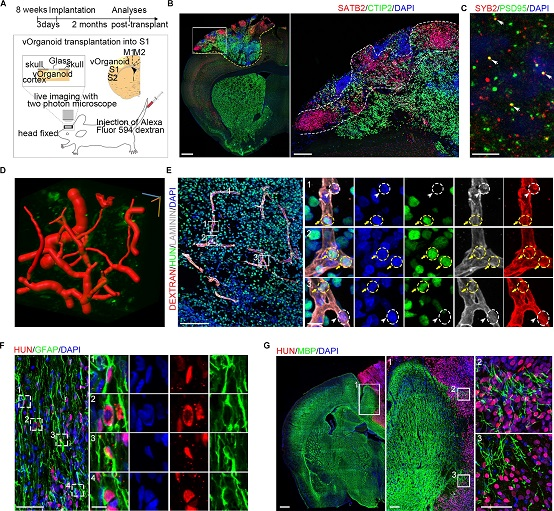WANG Xiaoqun research team sets up new system for vascularization of brain-like organs
WANG Xiaoqun and his team have been devoted to research in the development and function of the brain for many years. In recent years, the team has systematically analyzed cell types and cell characteristics during the development of human cortical embryos, exploring the regulatory mechanism that causes human neurons to grow rapidly and produce gyrus during embryonic development.
Cross-species studies have shown that the development of the cerebral cortex in humans and non-human primates is somewhat different from that of other lower animals (such as rodents). For example, it has OSVZ that contains a large number of ORG neural precursors and IPC intermediate nerve precursors. The diversity and abundance of these types of neural precursor cells promote the high-speed production of neurons and provide a cellular basis for the complex functional development of the human brain.
To conduct further research in this field, Wang’s team established the technology of cerebral-like cortex nurturing as early as 2012 and applied it to in vitro simulation of the development of microcephaly caused by ASPM gene mutation, and studied its pathological features.
At present, compared with the traditional two-dimensional nurturing method, three-dimensional brain-like organs have developmental characteristics and structures similar to the human brain, which can simulate the dynamic changes of cell types and the formation of neural circuits. Therefore, three-dimensional brain-like organs have been increasingly applied in early human brain development research. However, due to the lack of a circulatory system, the long-term nurturing of traditional brain-like organs is largely affected by hypoxia and internal cell death caused by an insufficient supply of oxygen and nutrients in the interior, which prevents the long-term nurturing of brain-like organs.
On May 13, 2020, WANG Xiaoqun, a researcher at the Institute of Biophysics of the Chinese Academy of Sciences (CAS), together with WU Qian, a professor at Beijing Normal University, published a paper titled “Vascularized human cortical organoids (vOrganoid) model cortical development in vivo”, which offers a good solution to the lack of oxygen and nutrients that limit the long-term development of brain-like organs by nurturing human embryonic stem cells and human umbilical vein endothelial cells (HUVECs), providing a way to obtain vascularization of brain organs.
The research also confirms that HUVECs vascular networks can accelerate the early maturation of brain-like organs. After internal transplantation, the endothelial cells in the vascular network of brain-like organs can be integrated into the host mouse’s vessel to form a new functional vascular network with a blood flow.
Brain-like organs are expected to be applied in studies or treatment of brain diseases in the future. The vascularization of brain-like organs will provide new ideas and plans for the optimized nurturing of brain-like organs, promoting its functional maturity and establishing a three-dimensional blood-brain barrier model in vitro, which has great potential for biological and medical applications.
The research was jointly carried out by the Institute of Biophysics of the Chinese Academy of Sciences and Beijing Normal University. Dr. SHI Yingchao, associate researcher SUN Le as well as WANG Mengdi and LIU Jianwei are the co-authors of this paper. This research also had the support of the pilot projects of CAS, the National Key R&D Program of China and the National Natural Science Foundation of China. The Laboratory Animal Feeding Platform and other platforms also provided support for the research.

The transplantation of vascularized brain-like organs
(The image by Dr. WANG Xiaoqun's lab)
The web link for this paper is https://journals.plos.org/plosbiology/article?id=10.1371/journal.pbio.3000705
Contact: WANG Xiaoqun
Institute of Biophysics, Chinese Academy of Sciences
Beijing 100101, China
Phone: 86-10-6488511
Email: xiaoqunwang@ibp.ac.cn
(Reported by Dr. WANG Xiaoqun's group)

